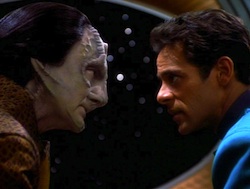“The Wire”
Written by Robert Hewitt Wolfe
Directed by Kim Friedman
Season 2, Episode 22
Production episode 40512-442
Original air date: May 8, 1994
Stardate: unknown
Station log. So McNulty has come into the squadroom completely hung over, and—
Whoops. Wrong “The Wire”….
Bashir and Garak are walking along the Promenade. Garak is frustrated as a freighter he’s expecting that’s carrying sweaters hasn’t arrived yet, and Bashir is tired because he was up late reading The Never-Ending Sacrifice. Garak says it’s the greatest Cardassian novel ever written. Bashir found it dull in spots; while Garak sings the praises of the repetitive epic, Bashir views it as a little too repetitive. Their literary criticism is interrupted by the fact that Garak is in obvious pain. Bashir’s attempts to take him to the infirmary are met with a stern refusal, and Garak goes back to his quarters to rest rather than let Bashir examine him.
Bashir helps Dax figure out what’s wrong with one of her plants, while discussing his bizarre relationship with Garak, then heads to the Promenade where he sees Garak making a deal with Quark. When Bashir asks, Quark says it’s just for a new sizing scanner (a super-duper sizing scanner with go-faster stripes), but Bashir doesn’t believe him, especially given how agitated Garak was.
The next day, Quark summons Bashir to his bar, where Garak is excessively drunk. However, he’s not so drunk that he can’t see through Bashir’s transparent attempt to get him to the infirmary. But the pain gets bad enough that Garak collapses. Bashir has Ops beam him all the way across the hall to the infirmary rather than wait for a cart. (This is particularly hilarious given that when Quark was shot in “Necessary Evil,” Bashir did wait for the cart.)
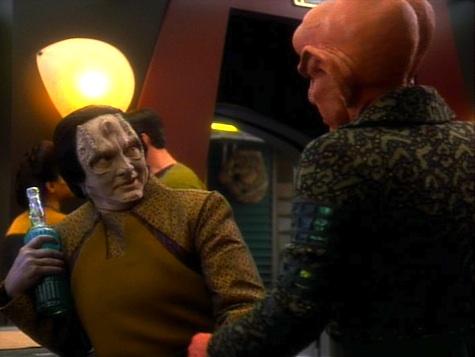
A scan of Garak reveals an implant in his brain. Odo—the closest they have to a Cardassian expert on the station—doesn’t recognize it. It’s been in place for years, but it only started causing him pain in the past few days. After Bashir mentions Garak’s deal with Quark, Odo perks up, as he’s monitored Quark making several calls to Cardassia Prime lately. He and Bashir monitor a call made late that night to a Cardassian named Boheeka who used to be assigned to the station. Quark gives him the requisition code Garak gave him, which immediately sets off an Obsidian Order alarm. Boheeka is suddenly scared to death and convinced that his career is over. Odo explains that the Order is Cardassia’s intelligence organization, the eyes and ears of the Cardassian government, and most Cardassian citizens are scared of the Order, with reason.
Garak has checked himself out of the infirmary, having left his coverall behind, which makes you wonder if he wandered home naked. Bashir goes to Garak’s quarters, where he’s giving himself a massive dose of a painkiller, which is barely doing the trick.
Finally, Garak explains what the implant is. He was given it by the head of the Order, Enabran Tain, and it was designed to go off if Garak was ever tortured. It pumps endorphins into his system, making him immune to pain and to torture, so he wouldn’t give up any intelligence he might have if captured.
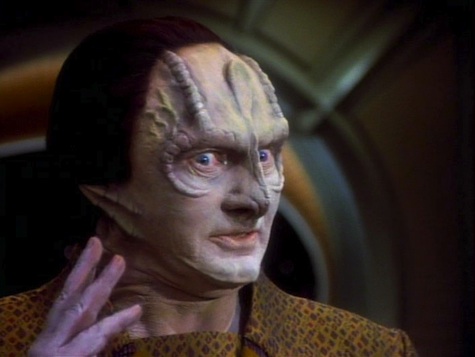
But it wasn’t meant for continuous use. Living on DS9 has been torture for Garak: the temperature is too low, the lights are too high, and the contempt of the Bajorans on the station is never-ending. So he turned the device on regularly, and eventually never turned it off, and is now dependent on it. But it’s breaking down.
When Bashir explains that Quark won’t be able to come through for him, Garak is philosophical about it. Perhaps he simply deserves what’s coming to him. To prove to Bashir that he’s not someone worthy of the doctor’s ministrations, he tells Bashir that he was a gul in the Central Command during the occupation of Bajor, and was ordered to stop some escaped Bajoran prisoners from leaving the planet. They stowed away on a Cardassian shuttle, the captain of whom refused to stop to be searched. So Garak destroyed the shuttle, killing not only the prisoners, but his aide, Elim, and several Cardassian civilians, one of whom was the daughter of an official. He was stripped of his rank and exiled to Terok Nor, later Deep Space 9.
It doesn’t even slow Bashir or his Hippocratic Oath down. He insists on helping Garak no matter what, and he convinces Garak to let him turn off the implant. Bashir remains with him while he goes through withdrawal, and refuses to let anyone see him (including a peeved Odo, who was hoping Garak could help him with some open cases he thinks the Order was involved with).
Bashir stays with Garak through the entire agonizing process of withdrawal. At one point Garak wakes up and is snappish and furious and destroys bunches of things in the cabin. He also changes his story: he and Elim were interrogating five Bajorans children. They were teenagers, street kids who knew nothing, so he let them go, and he was exiled for disobeying orders. Now he’s reduced to only looking forward to eating mediocre food once a week while staring across a table at Bashir’s smug, sanctimonious face. Garak then attacks Bashir and then has a seizure and falls unconscious.
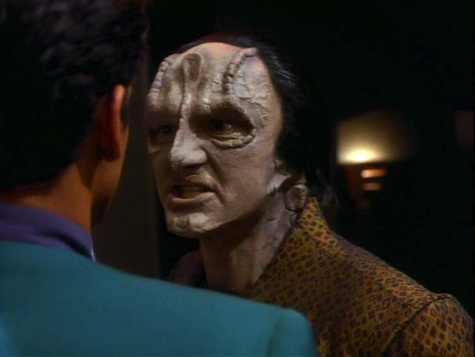
When he wakes up, he tells yet another story: he and Elim grew up together, were closer than brothers. They both became powerful men in the Obsidian Order, called “the sons of Tain.” But a scandal broke out regarding escaped Bajoran prisoners. By this time, Tain had retired to the Awarath colony and couldn’t protect them. Garak tried to frame Elim for the crime, but Elim beat him to it, and framed Garak, sending him into exile. He feels he deserved it for trying to betray his oldest friend. Then he falls back asleep.
Garak was kind enough to say where Tain retired to, so Bashir takes a runabout to Awarath to visit the retired head of the Order. Tain already knows quite a bit about Bashir, which disconcerts the doctor more than a little. Tain also asks after Garak. Bashir bluntly says that he’s dying. Tain says he should let him die, as a life in exile is no life at all for him.
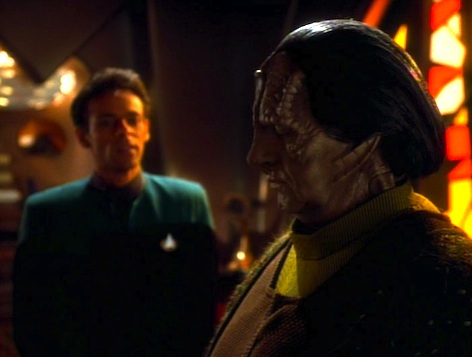
Bashir wants Tain to help him get the information to synthesize Cardassian leukocytes in order to save Garak’s life. Since Tain ordered Garak to put the implant in, he should know—but Tain never had to order Garak to do anything, that was why he was so valuable. Tain does provide the information for Bashir, because he wants Garak to live a long and miserable life on a station full of people who hate him.
Tain also reveals that “Elim” is actually Garak’s first name.
Garak fully recovers. Bashir asks which of the stories Garak told him were actually true, to which Garak says that they all were. “Even the lies?” Bashir asks.
“Especially the lies,” Garak replies with a smile.
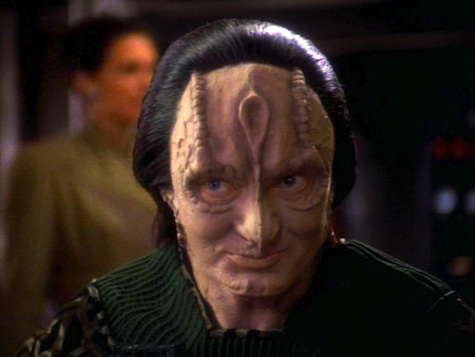
Can’t we just reverse the polarity? Bashir’s treatment of Garak is not aided by the fact that the Cardassians purged all their medical data from the infirmary computers when they pulled out of Bajor, so Bashir doesn’t have any kind of medical database to work with. Eventually, he’s able to figure out that he needs to synthesize leukocytes to make Garak better.
The Sisko is of Bajor: Bashir has to treat Sisko for a headache, induced by too much time yelling at admirals. Sisko, however, insists that he wasn’t yelling, he was disagreeing loudly.
For Cardassia! The Cardassian Obsidian Order is the most efficient intelligence organization in the quadrant. Odo says that they’re even more ruthless than the Tal Shiar. It will eventually be revealed that the Cardassian Union is jointly but independently run by the Central Command and the Order both. (Amusingly, the 1983 novel The Final Reflection by John M. Ford postulated a Klingon Empire that was very much like this. This was before The Next Generation firmly established the Klingons as Viking samurai, and Ford gave us an empire where service to the state was primary above all, and where the empire was jointly ruled by the military and by Imperial Intelligence, which was viewed with the same fear and loathing by the citizenry that the Obsidian Order is by Cardassians—and, for that matter, that the Romulan Tal Shiar was in TNG’s “Face of the Enemy.”)
Plain, simple: We still don’t know why Garak was exiled, but we do know that he was a protégé of Tain when he was the head of the Obsidian Order—though at the episode’s end, he denies to Odo that he was a member of the Order.
No sex, please, we’re Starfleet: When conversing with Quark, Boheeka asks if Hartla is still working the dabo tables, failing to waggle his eyebrows only by virtue of Cardassians not having them. He also says that she would have bankrupted him if the occupation had gone on much longer. Wah-HEY!
Preservation of mass and energy is for wimps: Odo spies on Quark’s outgoing transmissions, because his security training apparently came from the NSA. When Bashir asks if Odo has a similar bug in Bashir’s quarters, he just stares at the doctor and asks, “Should I?”
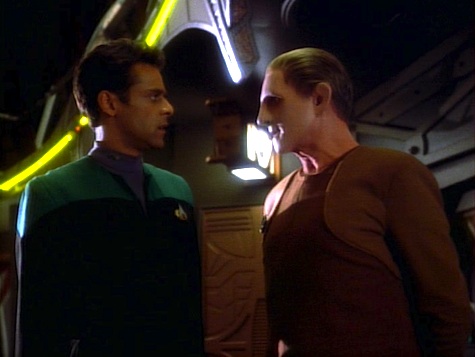
Keep your ears open: “Doctor, did anyone ever tell you that you’re an infuriating pest?”
“Chief O’Brien, all the time, and I don’t pay any attention to him, either.”
Garak and Bashir.
Welcome aboard: Not only is Andrew J. Robinson back as Garak, but he gets to be the focus of the episode. Ann Gillespie also returns as Nurse Jabara, and Jimmie F. Skaggs shows up as Boheeka.
But the big guest is Paul Dooley, making the first of four appearances as Enabran Tain. We’ll see him next in “Improbable Cause.”
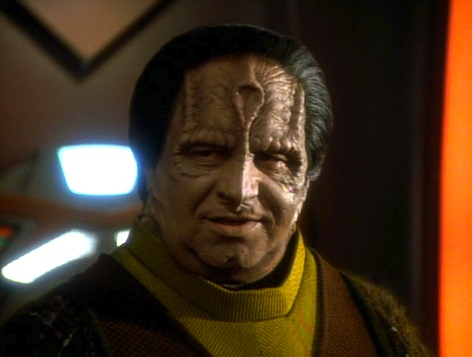
Trivial matters: This episode, besides revealing the existence of the Obsidian Order, also names the Cardassian homeworld as Cardassia Prime for the first time, and gives Garak’s first name of Elim. At one point, Garak refers to himself and “Elim” as “the sons of Tain,” and it will be revealed in “In Purgatory’s Shadow” that Garak is, in fact, Tain’s biological son, though Tain doesn’t acknowledge him as his son until moments before his death.
This is the only time Bashir’s middle name of Subatoi is ever referenced onscreen. He also says, “I’m a doctor, not a botanist” to Dax, echoing Dr. McCoy’s signature line, “I’m a doctor, not a [whatever]” from the original series.
Early drafts of the script had the intelligence organization called the Gray Order but the producers learned that Babylon 5 was going to have a Gray Council, so they changed the name.

Andrew J. Robinson would, in 2000, write a novel called A Stitch in Time, which is in essence Garak’s autobiography. It’s constructed as a long letter to Bashir. Tain’s retirement and the installation of the implant are both seen in this novel.
Una McCormack has titled two of her Trek novels after the two Cardassian novels discussed in this episode: The Never-Ending Sacrifice and the new release The Fall: The Crimson Shadow. In the former, the fictional novel itself plays a role in the storyline; the latter’s title is a play on Meditations on a Crimson Shadow, the novel Garak gives Bashir at the end of the episode.
Tain is established as having retired from being head of the Obsidian Order in this episode. The novels Stargazer: Obivion by Michael Jan Friedman, the aforementioned A Stitch in Time, and The Art of the Impossible by your humble rewatcher all showcase Tain during his time as head of the Order. He also appears in Susan Wright’s The Badlands duology. His Mirror Universe counterpart is also head of the Obsidian Order, and appears in both Dark Passions by Wright and Rise Like Lions by David Mack.
Walk with the Prophets: “I see that Garak hasn’t changed a bit.” It’s always fun watching a breakout character in action, a character who’s only intended as a one-off guest star or a minor supporting character who winds up becoming more dominant due to a perfect storm of writing and acting that leads folks to want more. We’ve seen it over and over again in genre shows with characters like Spike in Buffy the Vampire Slayer, Scorpius in Farscape, Castiel in Supernatural, and so on. Hell, probably the best example is one people probably forget about now, but DeForest Kelley’s Dr. McCoy was just part of the background ensemble in the original series’ first season, not elevated to opening-credits regular until the second year from the sheer power of his awesomeness.
While lots of people qualify as breakout characters on DS9, Garak is arguably the most fascinating, and this episode cements him as an integral part of the show, as he more or less gets his own episode. We learn more about him, and more about Cardassia in the process. So much is established here, but the most important is something that we don’t really see play out so much here as in future stories with Garak (not only onscreen, but in his role in the post-Dominion War fiction, where he plays an important role in Cardassian politics, from A Stitch in Time all the way to The Crimson Shadow): he is a patriot. He and Bashir discuss The Never-Ending Sacrifice as a novel about seven generations of a Cardassian family, who all give their lives over to service to the state. Garak views it as the pinnacle of Cardassian literature, and it’s partly because he believes in Cardassia. We saw hints of this in “Cardassians,” and in Tain’s description of Garak to Bashir as someone very eager to do his duty, and we’ll see a lot more of it in the future.
Andrew J. Robinson is never bad—even when he’s ill-used as he was in “Profit and Loss,” he’s delightful as all heck—and here we get to see him in multiple modes. Not just the affable fellow who obfuscates while being charming as all heck, but also someone in pain, someone going through withdrawal, and someone barely conscious. And throughout all of it, he’s still Garak, still living up to Tain’s oh-so-spot-on credo, “Never tell the truth when a lie will do.”
But I said this was “more or less” a Garak episode because it’s also a great showcase for Dr. Julian Bashir. The rough edges of the eager young twerp from season one have been smoothed and tempered. We see here a talented doctor who is utterly dedicated to his patients—Garak’s tale of mass murder doesn’t slow him down, and Odo’s attempts to browbeat him not only fail miserably, but earn Bashir a respectful head-nod from the constable—and still willing to stay up all night reading a book he doesn’t even like because he wants to learn. He gets a scene with Dax where he doesn’t hit on her (miracle of miracles) and he also admits to Garak that he’s well aware of the fact that O’Brien thinks he’s a ponce. Bashir’s maturation has been a delightful running concern this season, and it really comes into its own here.
Warp factor rating: 8
Keith R.A. DeCandido had a grand old time writing Enabran Tain at several different points in his career as head of the Obsidian Order in The Art of the Impossible. His next foray into Trek fiction will be The Klingon Art of War, out next spring (first look here at StarTrek.com). His latest work is Ragnarok and Roll: Tales of Cassie Zukav, Weirdness Magnet, a collection of urban fantasy short stories (read an excerpt from one story right here on Tor.com).










